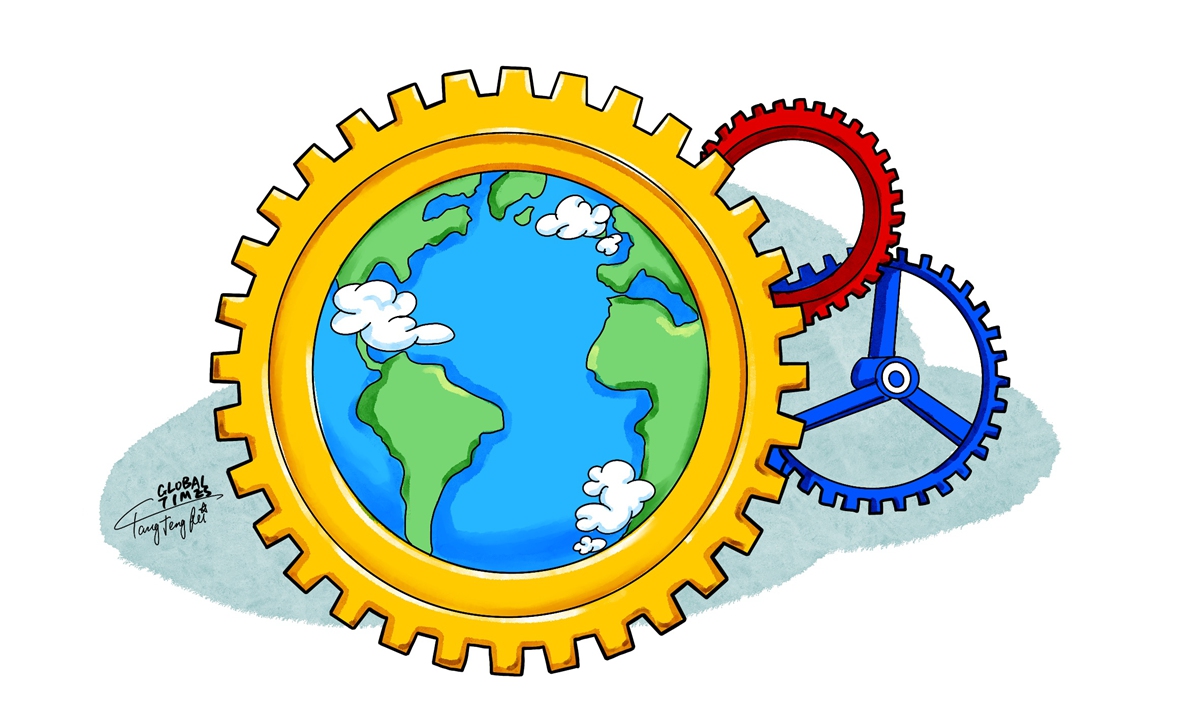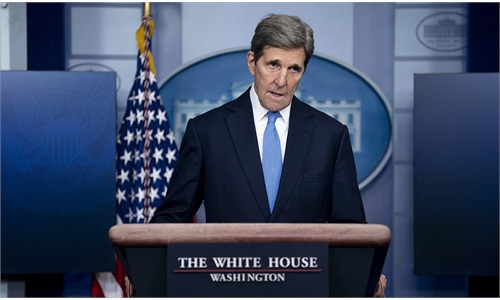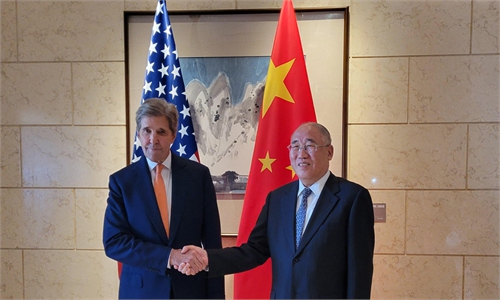
Illustration: Tang Tengfei/GT
There's no way the world can achieve its climate goals together without cooperation, especially between large emitting nations such as the US and China.
US climate envoy John Kerry, who visited China from Sunday to Wednesday, reiterated on Monday in Beijing that the US and China should be able to cooperate on climate change even as they wrangled with other disputes. While this is a good start, if climate cooperation is to be pursued, the long-term aim must be to achieve balanced all-round relations that respect each other's red lines. For example, due to Nancy Pelosi's visit to Taipei, climate talks have been suspended in the past.
As the US constantly provokes China's red lines, threatens its integrity, and ramps up the China threat hysteria, the world is needlessly pushed closer to great power conflict, which risks nuclear catastrophe that would result in the collapse of our biosphere.
Even without nuclear conflict, the US military is the single largest institutional source of greenhouse gas emissions in the world, according to Brown University's Costs of War Project. The environmental costs of war, such as depleted uranium, cause incalculable damage to the environment. Due to the Ukraine conflict, Europe is importing fracked gas, coal is coming back online, and what about the environmental costs of the sabotage of the Nord Stream pipeline? Consequently, when looking at humanity's impact on ecology and the climate, nothing can be bracketed off because we cannot escape our ecological system.
Development can't be bracketed off from climate change either. This is especially the case considering technological solutions for overcoming environmental catastrophes are the fruit of development. China, following an extended period of economic growth and prosperity, has produced an environmental miracle becoming a leader in clean energy, electric vehicles, and public transport.
As such, we must strive forward into a post-hegemonic era because only by taking the all-round developmental interests of the Global South can we overcome the climate crisis.
Not only must we enlarge our concept of ecological security, we must also put the climate crisis into a pragmatic development context that is viewed historically rather than just as a snapshot of today's world.
As the two biggest emitters, China and the US have a duty to work together, but the CO2 figures must not be politicized through decontextualization, which could be further used for an anti-China agenda and an anti-developmental agenda forced on the Global South.
One can well imagine that China's CO2 emissions data could be used to stigmatize China showing that it is twice as culpable as the US for the climate crisis. Undoubtedly, this would then be used to push the China threat narrative in the Western media - which, as already stated, risks war and ecological collapse.
Put in context though, China is in a completely different developmental situation to the US. From a domestic perspective, China's population is more than four times larger than the US meaning its CO2 emissions per capita are actually half that of the US. The average Chinese citizen leads a relatively ecologically friendly existence. Public transport for short and long-distance travel is ubiquitous, and public bike sharing is the norm.
From an international perspective, China is the world's factory. Much of what is made in China is consumed abroad - traditionally Western markets have been a major destination for exports, countries which in the quest for higher returns, have outsourced their pollution footprints to China. Thus unfairly placing a greater burden on China.
From a historical perspective, the majority of CO2 emissions in the atmosphere have come from the West. As early as 1895 the combined CO2 emissions of the US and what is the EU today were already over 1 billion tons per annum, by 1911 it was over 2 billion tons. Only in 1985 did China emit 2 billion, which coincided with the West shipping their polluting industries to China. In only two decades before 1985, the EU and the US had been pumping out between 5 to 8 billion tons year on year!
This context must be borne in mind as Kerry pushed China on its coal emissions, which account for around 60 percent of China's electricity generation. Considering the context outlined above, China should not be expected to sacrifice its development. Justice shows the greater burden must be placed on the developed world as it produces more CO2 per capita, has outsourced its pollution to the Global South, and have a historical CO2 debt to repay.[1]
China, despite the pressure placed on it by the US, is already ahead of the game when it comes to renewable energy. It is expected that China will easily surpass its target of supplying one-third of its power consumption through renewable sources by 2030 and President Xi Jinping has pledged to achieve carbon neutrality by 2060. China, with its systemic advantages, is already moving full steam ahead - Kerry needs to bear this in mind.
We must be mindful that this environmental justice is not just China's right but the right of the Global South which is also in the process of development.
The author is an independent international relations analyst who focuses on China's socialist development and global inequality. opinion@globaltimes.com.cn


